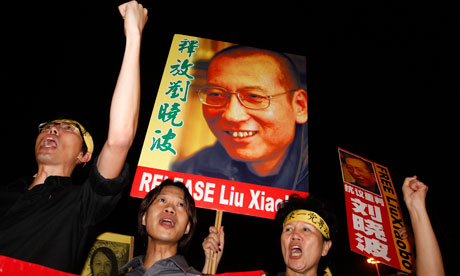Sampsonia Way Celebrates Liu Xiaobo’s Nobel Peace Prize
by Sampsonia Way / October 14, 2010 / No comments

Photo © http://jonathanstray.com
When the Nobel Foundation announced that Chinese intellectual and activist Liu Xiaobo won the Peace Prize, we celebrated at Sampsonia Way. The prize committee lauded Liu Xiaobo “for his long and non-violent struggle for fundamental human rights in China.” We hoped this would help the jailed writer gain his freedom.
However, the announcement ignited a furious response from China: They have detained other intellectuals and accused the Norwegian Nobel Committee of violating its own principles by honoring “a criminal.” Liu Xiaobo’s wife is now under house arrest.
Liu Xiaobo’s so-called criminal activities are primarily his publishing of anti-government literature that criticizes China’s lagging democratization and unacceptable stances on freedom of expression. He was also a key organizer of the 1989 Tiananmen Square demonstrations.
This is not the first time the Nobel Peace Prize committee has raised the ire of the Chinese government. They denounced the awarding of the prize to the Dalai Lama in 1989.
In the face of this controversy, Sampsonia Way can just say what we have witnessed: Liu Xiaobo is a person who fights for democracy and works to disseminate his and other people’s writing, expression, and thoughts. Is this not another way to contribute to peace in the world?
Below is a letter that Henry Reese, director of City of Asylum/Pittsburgh, wrote about Liu Xiaobo in 2009. The letter asks you to sign a petition protesting Liu Xiaobo’s arrest. In this letter, Reese also recalls when Liu Xiaobo was the president of Independent Chinese PEN and wrote to City of Asylum to celebrate the residence of the Chinese poet Huang Xiang in Pittsburgh.
Henry Reese: “Join me in signing the petition now”
In 2004, Chinese poet and dissident, Huang Xiang, came to live on Sampsonia Way in Pittsburgh. He was the first resident of City of Asylum/Pittsburgh, where I am the founder and director. Huang Xiang quickly made the urban row house his own by painting selections of his poetry on the outside walls in bold, grass-style Chinese calligraphy. The house seemed like a poetry anthology, and we started calling it “House Poem.”
That fall, Pittsburgh’s mayor and city council issued a proclamation declaring November 21, “Huang Xiang Day.” One-hundred fifty Pittsburghers—from all walks of life—gathered that rainy evening on Sampsonia Way to welcome the exiled poet. In the dim, flickering street light, Huang Xiang stood in front of “House Poem” and signed the front door. He then read his house to the crowd. Dancing, shouting, whispering and singing to the sky and earth, he startled everyone with the most dramatic ode to freedom we had ever experienced.
A few days later, I received a message from several Chinese poets. While they were sad that Huang Xiang could not publish or even read publicly in China, they were joyous that he had been so publicly honored in the United States. One letter, dated December 12, 2004, even came from Liu Xiaobo, the president of Independent Chinese PEN. He applauded our “mutual interests in freedom of expression and the rights of writers” and invited future cooperation.
Imagine my shock when I opened the newspaper the next morning to learn that Liu Xiaobo had been arrested and that his computer had been seized!
In that moment, the repression of writers in China became disturbingly personal. Did Liu Xiaobo’s invitation to me lead to his arrest? And what did it say about the situation in China that I could even think that there was a connection?
Liu Xiaobo was soon released. Since then, I have learned a good deal more about how far-reaching Chinese terror reaches. When they learned just how much Huang Xiang was a persona non grata to Chinese authorities, several American universities withdrew invitations to him, not wanting to jeopardize their cultural exchanges and relationships with Chinese institutions. Translators declined our offers of commissions to translate his work, fearing that Chinese authorities would deny them entry to the mainland. This is the flipside of the banality of evil.
On December 8, 2008, Liu Xiaobo was arrested again for co-authoring a pro-democracy manifesto. This time, the charges were far more serious and the consequences far more dangerous to him. I will never understand how Liu Xiaobo endures. But I do know that he deserves the few moments that it takes to click on the hyperlink below and sign a petition to protest his arrest. I’ve done it and I ask you to do the same.
Collectively our watchfulness does have an effect on Chinese authorities, so I ask that you join me in signing the petition now.
Henry Reese, founder
City of Asylum/Pittsburgh
Please sign this petition now!





